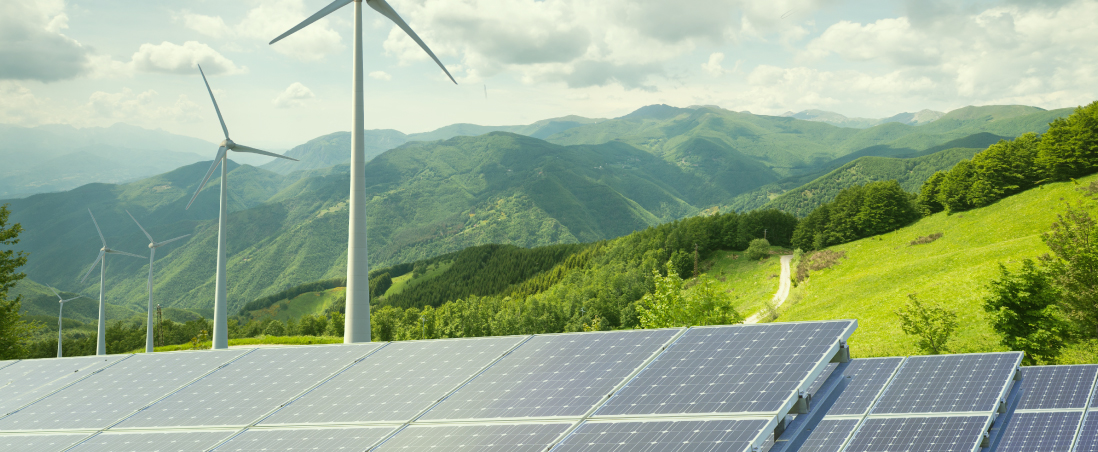Energy & Climate
The need for rapid emissions cuts, alongside growing global demand for (renewable) energy, raise critical questions. In this course, we will cover fundamental knowledge, specific case studies, as well as possible solutions for novel energy systems. We will address technical, social and political issues raised by renewable energy (solar, wind, hydropower and bioenergy) necessities. Geographic Information Systems (GIS), and other modelling frameworks will also help us tackle some of these issues.
The oil crises of the 1970s provoked debates about the finite limits of energy resources and triggered increases in energy efficiency and innovations in the production of alternative fuels/renewable energy technologies.This should lead to low-carbon energy technologies, in many case decentralised due to their positive socio-economic and ecological impacts.
Yet despite these developments, the following decades saw rather energy consumption increase dramatically – first in the Global North and later in the Global South. For all that, electric power is still scarce and electricity supply is unreliable in many developing countries such as India, Indonesia and most African states, particularly in territorially remote locations
If these countries increase their use of fossil fuels to meet the rising energy demands of their growing populations, while established major emitters fail to reduce their emissions dramatically, atmospheric concentrations of greenhouse gases will lead to unmanageable global warming.
Since 1992, the international community has negotiated successive agreements that aim to considerably reduce greenhouse gas emissions to net zero levels in the second part of this century.
These agreements assume an intensifying effort to replace fossil fuels (or reduce their consumption) by using renewable energy sources and drive significant improvements in the energy efficiency of industries, transport and cities. However, the need for rapid emission reductions goes well beyond what a transition to non-carbon based fuels can provide – raising questions about geo-engineering and other potential technologies and their impacts.
The need for rapid emissions cuts, alongside growing global demand for (renewable) energy, raise critical questions about the technological potential and socio-economic and political implications of various technologies and approaches.
The Summer School will start with a theoretical introduction to the political background of the topic. Decisions at all levels of governance will be discussed and how they contribute to managing – or slowing down – how the growing demand for renewable energy is met. The political context of climate change, climate justice and the current energy transition, has been strongly influenced by international climate negotiations, from Kyoto Protocol to P4G Summit Copenhagen, Paris Agreement to the COP24 held in Poland in December 2018.
Driven also by the political demands scientists at universities and research institutes as well as in the industrial sector working on novel energy conversion and storage systems, around the world. This is urgently required for a secure and affordable supply of environmental friendly energy. As future energy systems will be diverse, a broad knowledge of different conversion and storage applications is needed. Therefore, we will cover fundamental knowledge, specific case studies as well as possible solutions for novel energy systems from an engineering point of view. The development of flexible decentralized smart energy systems and the hybridization of renewable energy systems will be presented during the summer school. They are widely discussed in the energy strategic planning on European and international level in order to end up with efficient systems with minimum environmental impact and CO2 footprints.
Having technical solutions available, local demand for renewable energy is generated by communities discussing energy self-sufficiency and potentials of increased regional economic value added from renewable energies – for instance, in the context of the German “Energiewende” (energy transition). Many of these changes remain highly contested at all levels, from the international to the local. In many regions of the world the access to energy increasingly renewable is also a question of inequality and justice. The Summer School will address technical, social and political issues raised by renewable energy (solar, wind, hydropower and bioenergy). Geographic Information Systems (GIS) and other modeling frameworks will also help us tackle some of these questions.
During both weeks renowned experts from various countries around the world will offer rich insights into current issues of the globally important topic of Energy and Climate Change.
Webmaster: Thorsten Parchent, Telefon: 5319


